Tourism and Society: An In-Depth Analysis of Impacts and Theories
VerifiedAdded on 2023/06/04
|8
|2771
|361
Report
AI Summary
This report investigates the intricate relationship between tourism and society, delving into the impacts of tourism through the lens of sociological theories, principles, and practices. It examines how socio-cultural, political, and economic contexts influence sustainability within the tourism sector. The analysis incorporates the tourism life cycle model to illustrate the stages of tourism development and the PESTLE analysis to assess the external factors affecting the industry. The report highlights both the positive and negative impacts of tourism, including economic benefits, cultural exchanges, and potential social and environmental challenges. It further explores the role of government regulations, technological advancements, and changing consumer preferences in shaping the tourism landscape, ultimately emphasizing the importance of accessible tourism and responsible practices for fostering a sustainable and equitable industry.
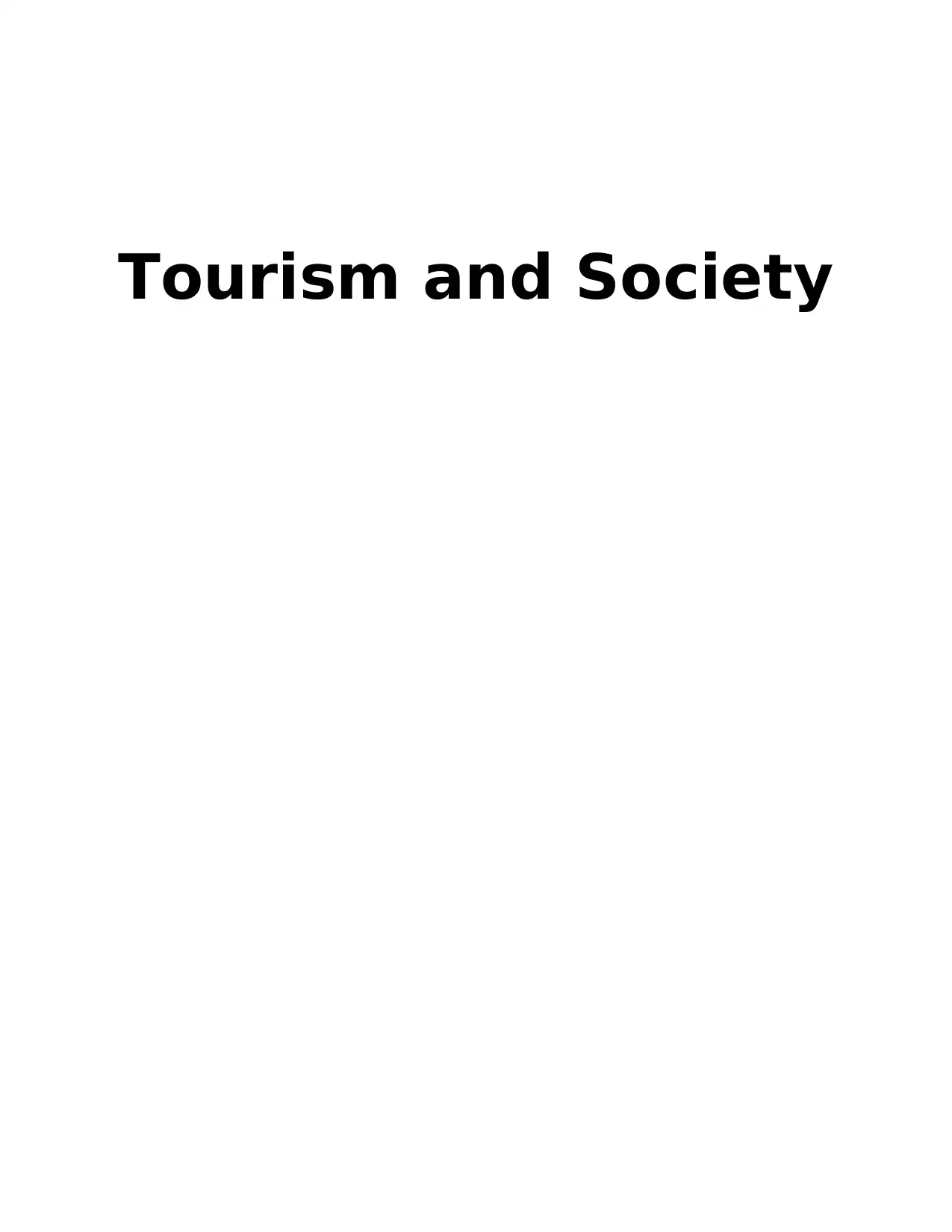
Tourism and Society
Paraphrase This Document
Need a fresh take? Get an instant paraphrase of this document with our AI Paraphraser

Contents
INTRODUCTION...........................................................................................................................1
MAIN BODY...................................................................................................................................1
CONCLUSION ...............................................................................................................................5
REFERENCES................................................................................................................................6
INTRODUCTION...........................................................................................................................1
MAIN BODY...................................................................................................................................1
CONCLUSION ...............................................................................................................................5
REFERENCES................................................................................................................................6
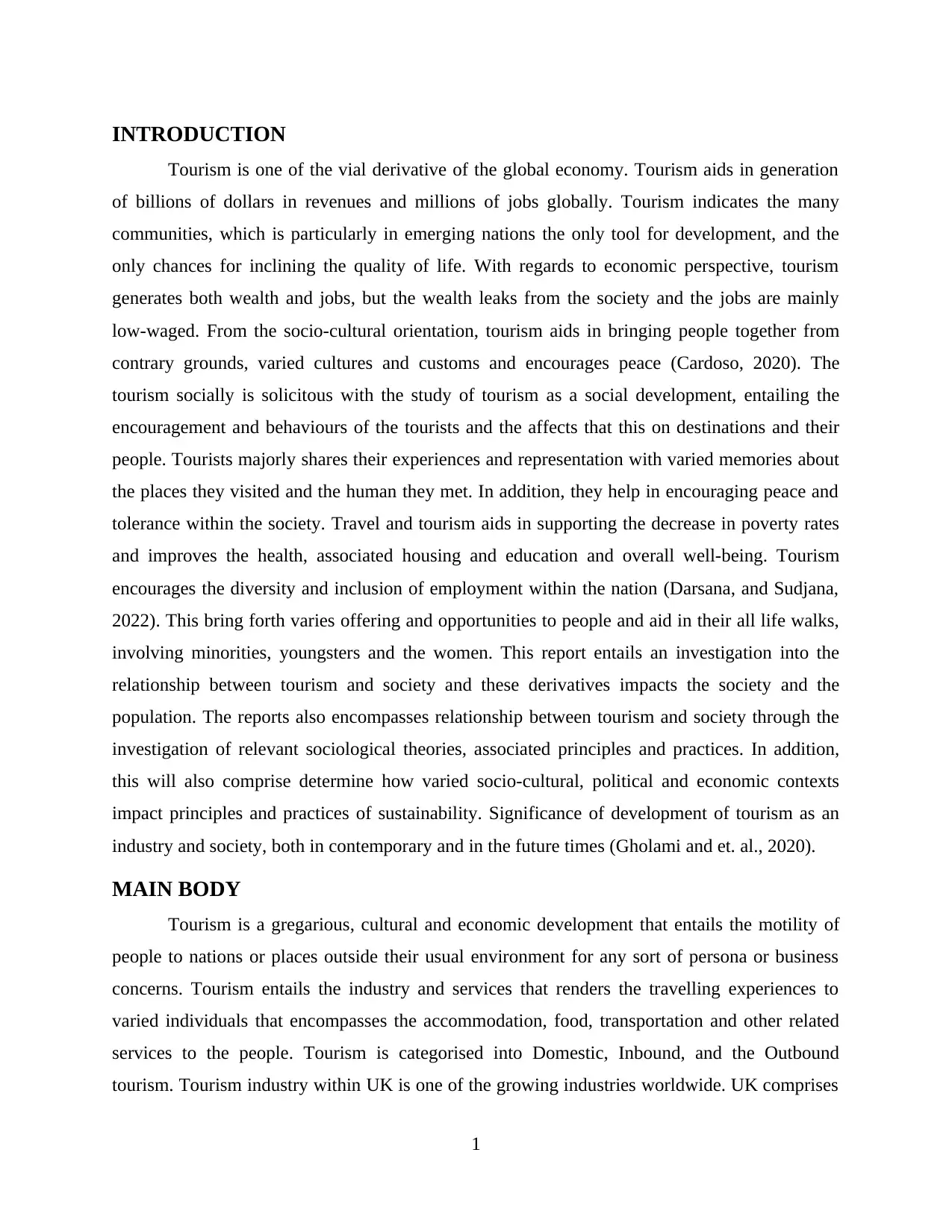
INTRODUCTION
Tourism is one of the vial derivative of the global economy. Tourism aids in generation
of billions of dollars in revenues and millions of jobs globally. Tourism indicates the many
communities, which is particularly in emerging nations the only tool for development, and the
only chances for inclining the quality of life. With regards to economic perspective, tourism
generates both wealth and jobs, but the wealth leaks from the society and the jobs are mainly
low-waged. From the socio-cultural orientation, tourism aids in bringing people together from
contrary grounds, varied cultures and customs and encourages peace (Cardoso, 2020). The
tourism socially is solicitous with the study of tourism as a social development, entailing the
encouragement and behaviours of the tourists and the affects that this on destinations and their
people. Tourists majorly shares their experiences and representation with varied memories about
the places they visited and the human they met. In addition, they help in encouraging peace and
tolerance within the society. Travel and tourism aids in supporting the decrease in poverty rates
and improves the health, associated housing and education and overall well-being. Tourism
encourages the diversity and inclusion of employment within the nation (Darsana, and Sudjana,
2022). This bring forth varies offering and opportunities to people and aid in their all life walks,
involving minorities, youngsters and the women. This report entails an investigation into the
relationship between tourism and society and these derivatives impacts the society and the
population. The reports also encompasses relationship between tourism and society through the
investigation of relevant sociological theories, associated principles and practices. In addition,
this will also comprise determine how varied socio-cultural, political and economic contexts
impact principles and practices of sustainability. Significance of development of tourism as an
industry and society, both in contemporary and in the future times (Gholami and et. al., 2020).
MAIN BODY
Tourism is a gregarious, cultural and economic development that entails the motility of
people to nations or places outside their usual environment for any sort of persona or business
concerns. Tourism entails the industry and services that renders the travelling experiences to
varied individuals that encompasses the accommodation, food, transportation and other related
services to the people. Tourism is categorised into Domestic, Inbound, and the Outbound
tourism. Tourism industry within UK is one of the growing industries worldwide. UK comprises
1
Tourism is one of the vial derivative of the global economy. Tourism aids in generation
of billions of dollars in revenues and millions of jobs globally. Tourism indicates the many
communities, which is particularly in emerging nations the only tool for development, and the
only chances for inclining the quality of life. With regards to economic perspective, tourism
generates both wealth and jobs, but the wealth leaks from the society and the jobs are mainly
low-waged. From the socio-cultural orientation, tourism aids in bringing people together from
contrary grounds, varied cultures and customs and encourages peace (Cardoso, 2020). The
tourism socially is solicitous with the study of tourism as a social development, entailing the
encouragement and behaviours of the tourists and the affects that this on destinations and their
people. Tourists majorly shares their experiences and representation with varied memories about
the places they visited and the human they met. In addition, they help in encouraging peace and
tolerance within the society. Travel and tourism aids in supporting the decrease in poverty rates
and improves the health, associated housing and education and overall well-being. Tourism
encourages the diversity and inclusion of employment within the nation (Darsana, and Sudjana,
2022). This bring forth varies offering and opportunities to people and aid in their all life walks,
involving minorities, youngsters and the women. This report entails an investigation into the
relationship between tourism and society and these derivatives impacts the society and the
population. The reports also encompasses relationship between tourism and society through the
investigation of relevant sociological theories, associated principles and practices. In addition,
this will also comprise determine how varied socio-cultural, political and economic contexts
impact principles and practices of sustainability. Significance of development of tourism as an
industry and society, both in contemporary and in the future times (Gholami and et. al., 2020).
MAIN BODY
Tourism is a gregarious, cultural and economic development that entails the motility of
people to nations or places outside their usual environment for any sort of persona or business
concerns. Tourism entails the industry and services that renders the travelling experiences to
varied individuals that encompasses the accommodation, food, transportation and other related
services to the people. Tourism is categorised into Domestic, Inbound, and the Outbound
tourism. Tourism industry within UK is one of the growing industries worldwide. UK comprises
1
⊘ This is a preview!⊘
Do you want full access?
Subscribe today to unlock all pages.

Trusted by 1+ million students worldwide
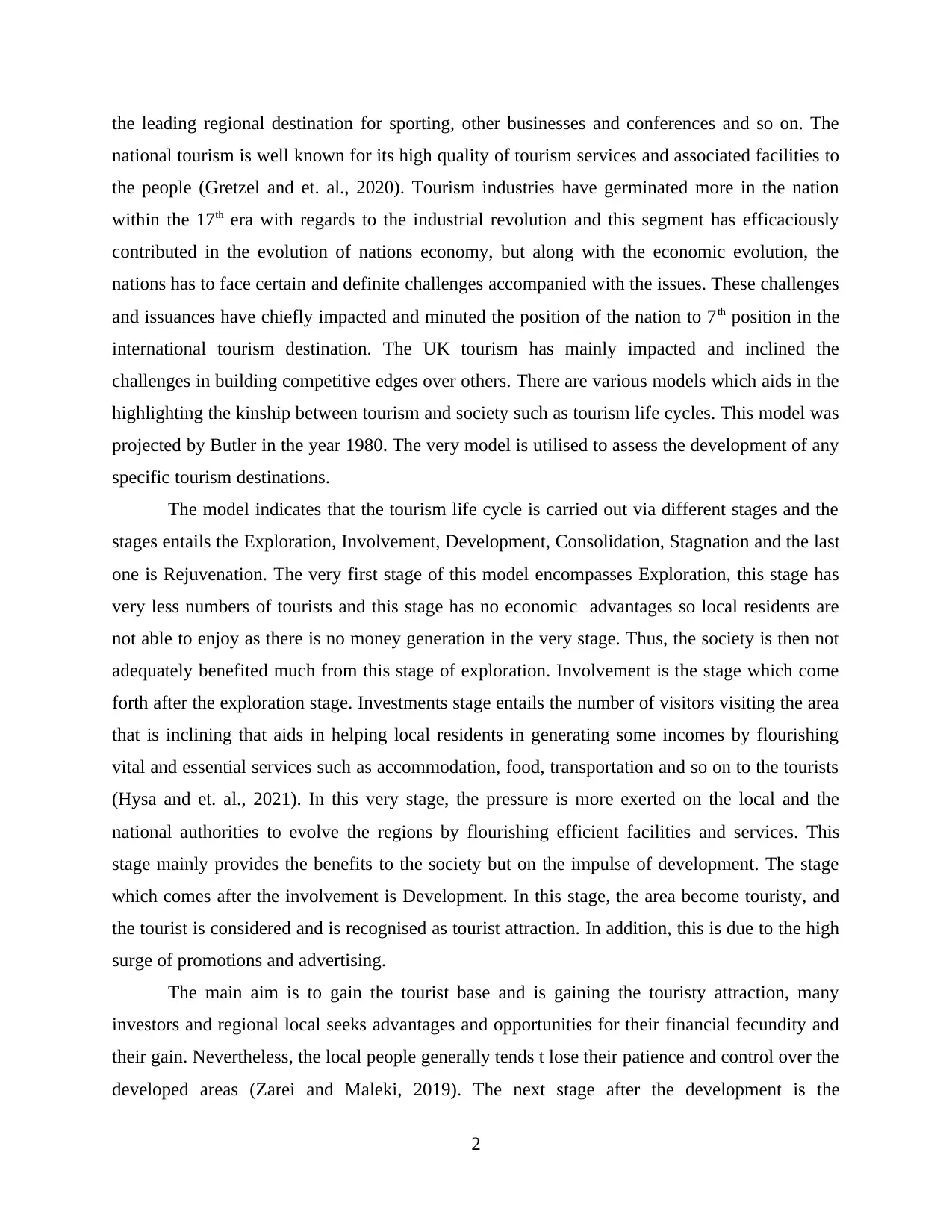
the leading regional destination for sporting, other businesses and conferences and so on. The
national tourism is well known for its high quality of tourism services and associated facilities to
the people (Gretzel and et. al., 2020). Tourism industries have germinated more in the nation
within the 17th era with regards to the industrial revolution and this segment has efficaciously
contributed in the evolution of nations economy, but along with the economic evolution, the
nations has to face certain and definite challenges accompanied with the issues. These challenges
and issuances have chiefly impacted and minuted the position of the nation to 7th position in the
international tourism destination. The UK tourism has mainly impacted and inclined the
challenges in building competitive edges over others. There are various models which aids in the
highlighting the kinship between tourism and society such as tourism life cycles. This model was
projected by Butler in the year 1980. The very model is utilised to assess the development of any
specific tourism destinations.
The model indicates that the tourism life cycle is carried out via different stages and the
stages entails the Exploration, Involvement, Development, Consolidation, Stagnation and the last
one is Rejuvenation. The very first stage of this model encompasses Exploration, this stage has
very less numbers of tourists and this stage has no economic advantages so local residents are
not able to enjoy as there is no money generation in the very stage. Thus, the society is then not
adequately benefited much from this stage of exploration. Involvement is the stage which come
forth after the exploration stage. Investments stage entails the number of visitors visiting the area
that is inclining that aids in helping local residents in generating some incomes by flourishing
vital and essential services such as accommodation, food, transportation and so on to the tourists
(Hysa and et. al., 2021). In this very stage, the pressure is more exerted on the local and the
national authorities to evolve the regions by flourishing efficient facilities and services. This
stage mainly provides the benefits to the society but on the impulse of development. The stage
which comes after the involvement is Development. In this stage, the area become touristy, and
the tourist is considered and is recognised as tourist attraction. In addition, this is due to the high
surge of promotions and advertising.
The main aim is to gain the tourist base and is gaining the touristy attraction, many
investors and regional local seeks advantages and opportunities for their financial fecundity and
their gain. Nevertheless, the local people generally tends t lose their patience and control over the
developed areas (Zarei and Maleki, 2019). The next stage after the development is the
2
national tourism is well known for its high quality of tourism services and associated facilities to
the people (Gretzel and et. al., 2020). Tourism industries have germinated more in the nation
within the 17th era with regards to the industrial revolution and this segment has efficaciously
contributed in the evolution of nations economy, but along with the economic evolution, the
nations has to face certain and definite challenges accompanied with the issues. These challenges
and issuances have chiefly impacted and minuted the position of the nation to 7th position in the
international tourism destination. The UK tourism has mainly impacted and inclined the
challenges in building competitive edges over others. There are various models which aids in the
highlighting the kinship between tourism and society such as tourism life cycles. This model was
projected by Butler in the year 1980. The very model is utilised to assess the development of any
specific tourism destinations.
The model indicates that the tourism life cycle is carried out via different stages and the
stages entails the Exploration, Involvement, Development, Consolidation, Stagnation and the last
one is Rejuvenation. The very first stage of this model encompasses Exploration, this stage has
very less numbers of tourists and this stage has no economic advantages so local residents are
not able to enjoy as there is no money generation in the very stage. Thus, the society is then not
adequately benefited much from this stage of exploration. Involvement is the stage which come
forth after the exploration stage. Investments stage entails the number of visitors visiting the area
that is inclining that aids in helping local residents in generating some incomes by flourishing
vital and essential services such as accommodation, food, transportation and so on to the tourists
(Hysa and et. al., 2021). In this very stage, the pressure is more exerted on the local and the
national authorities to evolve the regions by flourishing efficient facilities and services. This
stage mainly provides the benefits to the society but on the impulse of development. The stage
which comes after the involvement is Development. In this stage, the area become touristy, and
the tourist is considered and is recognised as tourist attraction. In addition, this is due to the high
surge of promotions and advertising.
The main aim is to gain the tourist base and is gaining the touristy attraction, many
investors and regional local seeks advantages and opportunities for their financial fecundity and
their gain. Nevertheless, the local people generally tends t lose their patience and control over the
developed areas (Zarei and Maleki, 2019). The next stage after the development is the
2
Paraphrase This Document
Need a fresh take? Get an instant paraphrase of this document with our AI Paraphraser
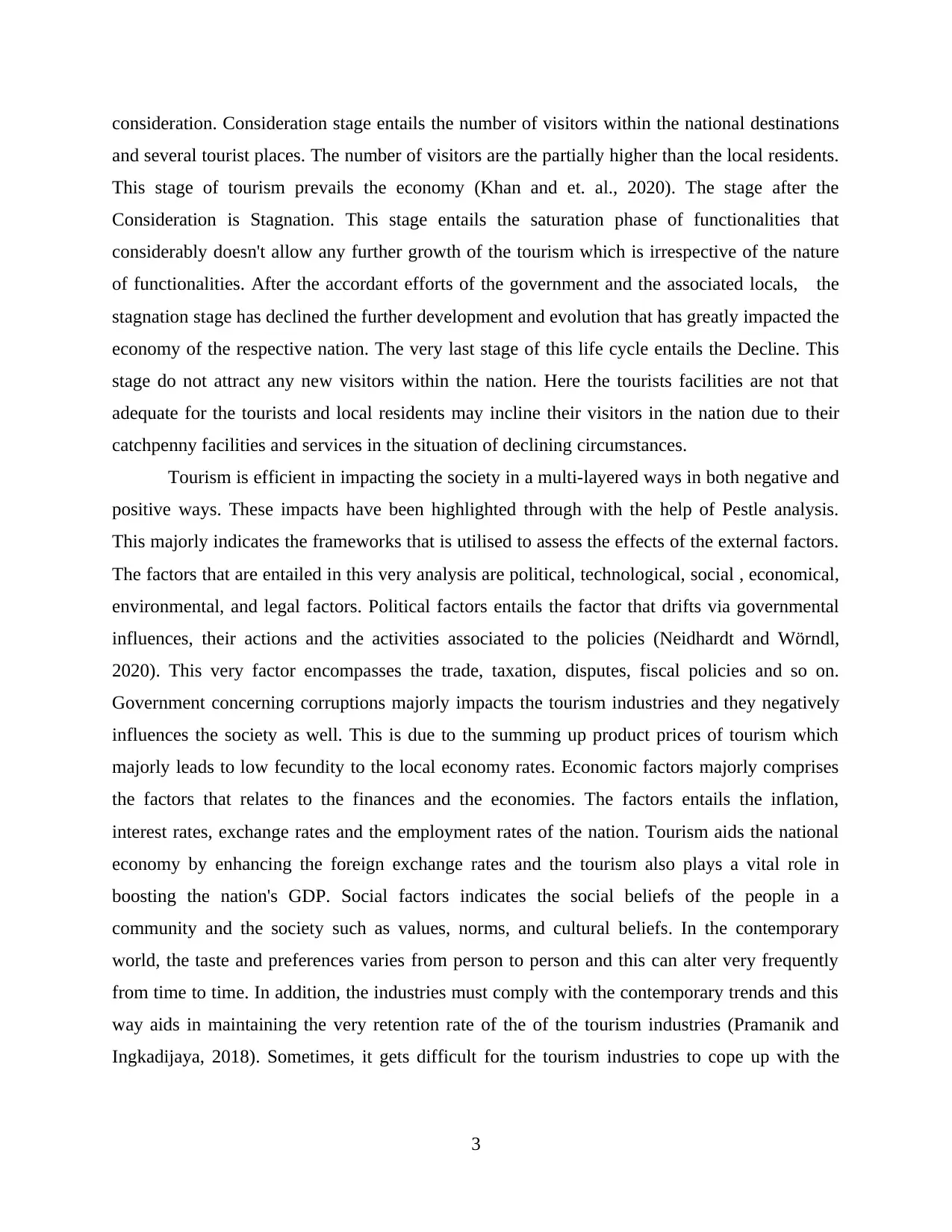
consideration. Consideration stage entails the number of visitors within the national destinations
and several tourist places. The number of visitors are the partially higher than the local residents.
This stage of tourism prevails the economy (Khan and et. al., 2020). The stage after the
Consideration is Stagnation. This stage entails the saturation phase of functionalities that
considerably doesn't allow any further growth of the tourism which is irrespective of the nature
of functionalities. After the accordant efforts of the government and the associated locals, the
stagnation stage has declined the further development and evolution that has greatly impacted the
economy of the respective nation. The very last stage of this life cycle entails the Decline. This
stage do not attract any new visitors within the nation. Here the tourists facilities are not that
adequate for the tourists and local residents may incline their visitors in the nation due to their
catchpenny facilities and services in the situation of declining circumstances.
Tourism is efficient in impacting the society in a multi-layered ways in both negative and
positive ways. These impacts have been highlighted through with the help of Pestle analysis.
This majorly indicates the frameworks that is utilised to assess the effects of the external factors.
The factors that are entailed in this very analysis are political, technological, social , economical,
environmental, and legal factors. Political factors entails the factor that drifts via governmental
influences, their actions and the activities associated to the policies (Neidhardt and Wörndl,
2020). This very factor encompasses the trade, taxation, disputes, fiscal policies and so on.
Government concerning corruptions majorly impacts the tourism industries and they negatively
influences the society as well. This is due to the summing up product prices of tourism which
majorly leads to low fecundity to the local economy rates. Economic factors majorly comprises
the factors that relates to the finances and the economies. The factors entails the inflation,
interest rates, exchange rates and the employment rates of the nation. Tourism aids the national
economy by enhancing the foreign exchange rates and the tourism also plays a vital role in
boosting the nation's GDP. Social factors indicates the social beliefs of the people in a
community and the society such as values, norms, and cultural beliefs. In the contemporary
world, the taste and preferences varies from person to person and this can alter very frequently
from time to time. In addition, the industries must comply with the contemporary trends and this
way aids in maintaining the very retention rate of the of the tourism industries (Pramanik and
Ingkadijaya, 2018). Sometimes, it gets difficult for the tourism industries to cope up with the
3
and several tourist places. The number of visitors are the partially higher than the local residents.
This stage of tourism prevails the economy (Khan and et. al., 2020). The stage after the
Consideration is Stagnation. This stage entails the saturation phase of functionalities that
considerably doesn't allow any further growth of the tourism which is irrespective of the nature
of functionalities. After the accordant efforts of the government and the associated locals, the
stagnation stage has declined the further development and evolution that has greatly impacted the
economy of the respective nation. The very last stage of this life cycle entails the Decline. This
stage do not attract any new visitors within the nation. Here the tourists facilities are not that
adequate for the tourists and local residents may incline their visitors in the nation due to their
catchpenny facilities and services in the situation of declining circumstances.
Tourism is efficient in impacting the society in a multi-layered ways in both negative and
positive ways. These impacts have been highlighted through with the help of Pestle analysis.
This majorly indicates the frameworks that is utilised to assess the effects of the external factors.
The factors that are entailed in this very analysis are political, technological, social , economical,
environmental, and legal factors. Political factors entails the factor that drifts via governmental
influences, their actions and the activities associated to the policies (Neidhardt and Wörndl,
2020). This very factor encompasses the trade, taxation, disputes, fiscal policies and so on.
Government concerning corruptions majorly impacts the tourism industries and they negatively
influences the society as well. This is due to the summing up product prices of tourism which
majorly leads to low fecundity to the local economy rates. Economic factors majorly comprises
the factors that relates to the finances and the economies. The factors entails the inflation,
interest rates, exchange rates and the employment rates of the nation. Tourism aids the national
economy by enhancing the foreign exchange rates and the tourism also plays a vital role in
boosting the nation's GDP. Social factors indicates the social beliefs of the people in a
community and the society such as values, norms, and cultural beliefs. In the contemporary
world, the taste and preferences varies from person to person and this can alter very frequently
from time to time. In addition, the industries must comply with the contemporary trends and this
way aids in maintaining the very retention rate of the of the tourism industries (Pramanik and
Ingkadijaya, 2018). Sometimes, it gets difficult for the tourism industries to cope up with the
3
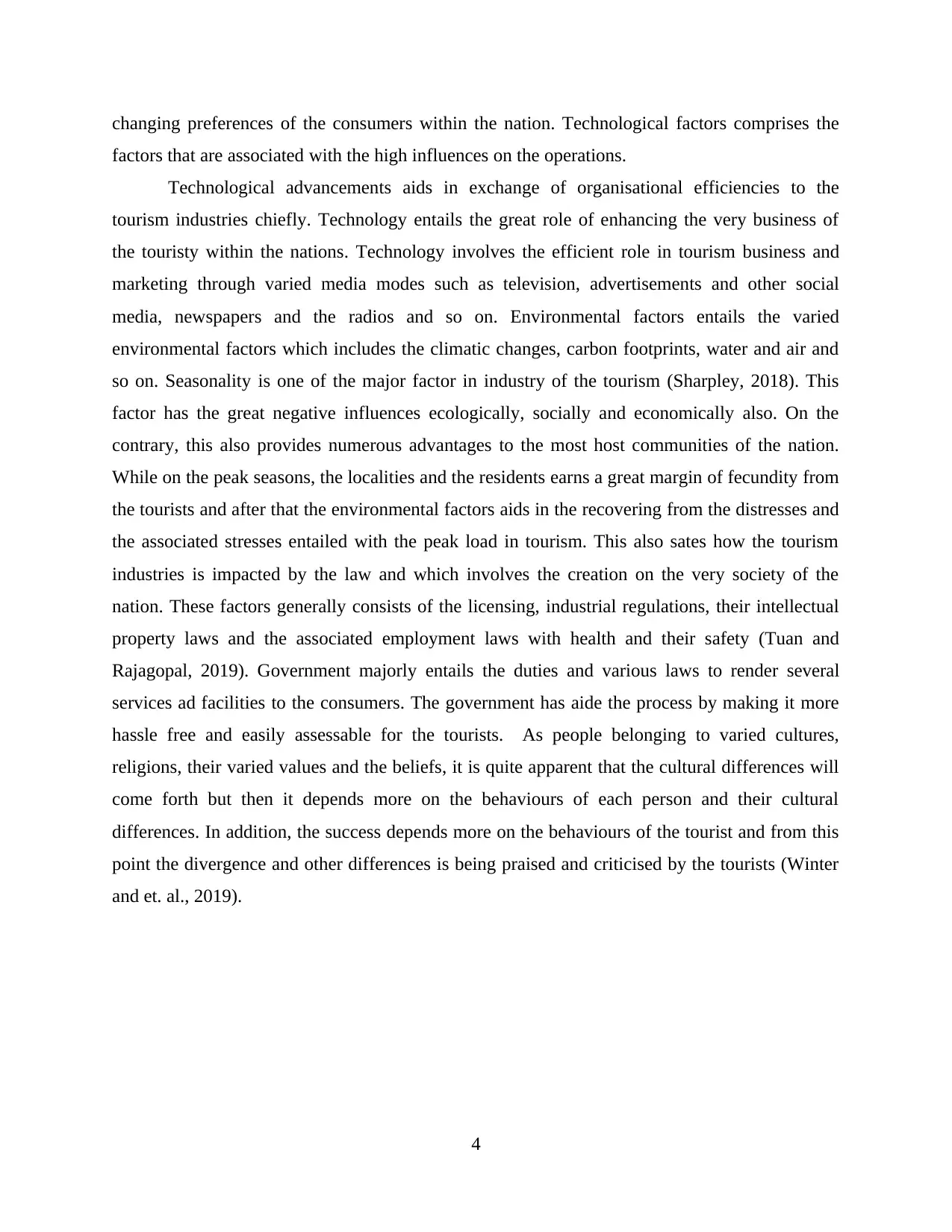
changing preferences of the consumers within the nation. Technological factors comprises the
factors that are associated with the high influences on the operations.
Technological advancements aids in exchange of organisational efficiencies to the
tourism industries chiefly. Technology entails the great role of enhancing the very business of
the touristy within the nations. Technology involves the efficient role in tourism business and
marketing through varied media modes such as television, advertisements and other social
media, newspapers and the radios and so on. Environmental factors entails the varied
environmental factors which includes the climatic changes, carbon footprints, water and air and
so on. Seasonality is one of the major factor in industry of the tourism (Sharpley, 2018). This
factor has the great negative influences ecologically, socially and economically also. On the
contrary, this also provides numerous advantages to the most host communities of the nation.
While on the peak seasons, the localities and the residents earns a great margin of fecundity from
the tourists and after that the environmental factors aids in the recovering from the distresses and
the associated stresses entailed with the peak load in tourism. This also sates how the tourism
industries is impacted by the law and which involves the creation on the very society of the
nation. These factors generally consists of the licensing, industrial regulations, their intellectual
property laws and the associated employment laws with health and their safety (Tuan and
Rajagopal, 2019). Government majorly entails the duties and various laws to render several
services ad facilities to the consumers. The government has aide the process by making it more
hassle free and easily assessable for the tourists. As people belonging to varied cultures,
religions, their varied values and the beliefs, it is quite apparent that the cultural differences will
come forth but then it depends more on the behaviours of each person and their cultural
differences. In addition, the success depends more on the behaviours of the tourist and from this
point the divergence and other differences is being praised and criticised by the tourists (Winter
and et. al., 2019).
4
factors that are associated with the high influences on the operations.
Technological advancements aids in exchange of organisational efficiencies to the
tourism industries chiefly. Technology entails the great role of enhancing the very business of
the touristy within the nations. Technology involves the efficient role in tourism business and
marketing through varied media modes such as television, advertisements and other social
media, newspapers and the radios and so on. Environmental factors entails the varied
environmental factors which includes the climatic changes, carbon footprints, water and air and
so on. Seasonality is one of the major factor in industry of the tourism (Sharpley, 2018). This
factor has the great negative influences ecologically, socially and economically also. On the
contrary, this also provides numerous advantages to the most host communities of the nation.
While on the peak seasons, the localities and the residents earns a great margin of fecundity from
the tourists and after that the environmental factors aids in the recovering from the distresses and
the associated stresses entailed with the peak load in tourism. This also sates how the tourism
industries is impacted by the law and which involves the creation on the very society of the
nation. These factors generally consists of the licensing, industrial regulations, their intellectual
property laws and the associated employment laws with health and their safety (Tuan and
Rajagopal, 2019). Government majorly entails the duties and various laws to render several
services ad facilities to the consumers. The government has aide the process by making it more
hassle free and easily assessable for the tourists. As people belonging to varied cultures,
religions, their varied values and the beliefs, it is quite apparent that the cultural differences will
come forth but then it depends more on the behaviours of each person and their cultural
differences. In addition, the success depends more on the behaviours of the tourist and from this
point the divergence and other differences is being praised and criticised by the tourists (Winter
and et. al., 2019).
4
⊘ This is a preview!⊘
Do you want full access?
Subscribe today to unlock all pages.

Trusted by 1+ million students worldwide
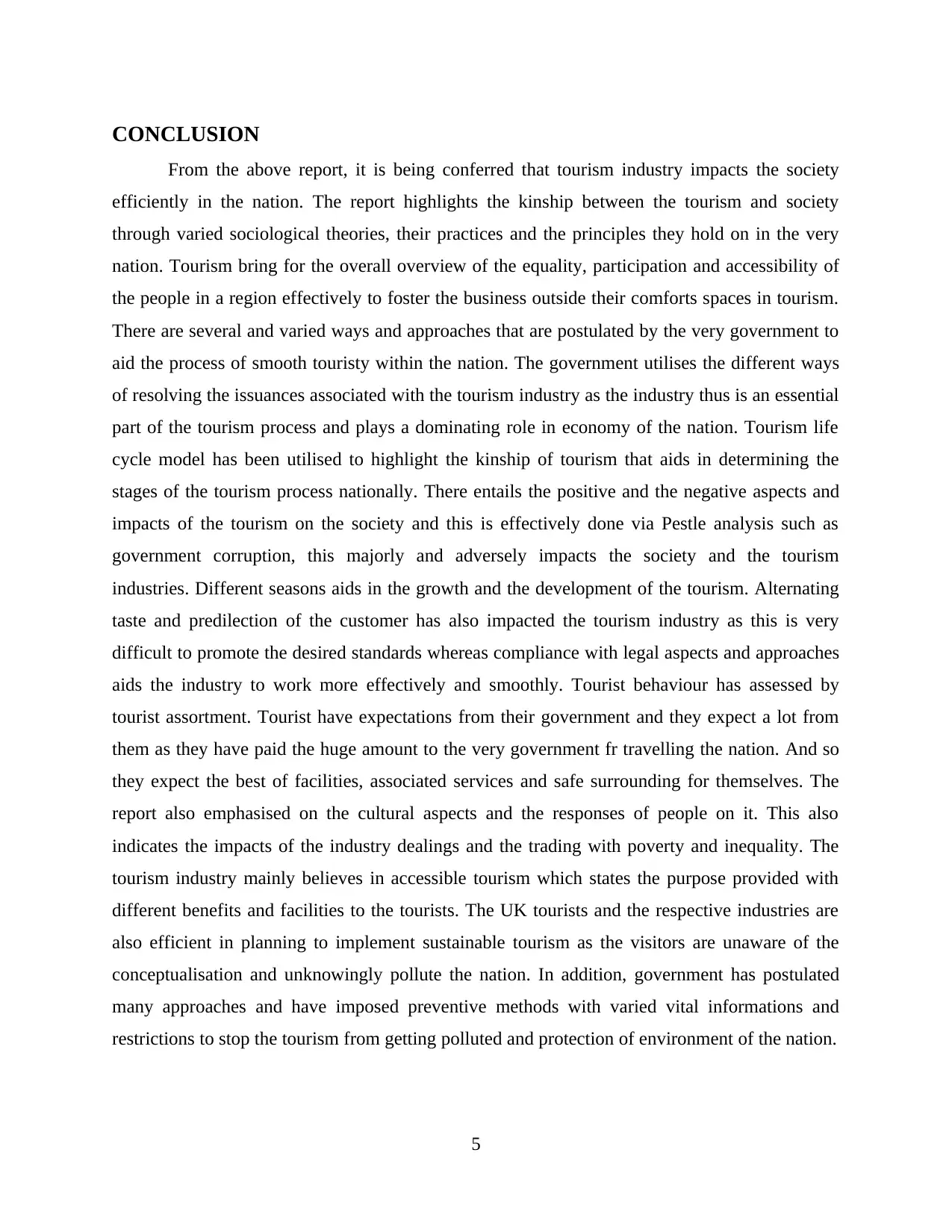
CONCLUSION
From the above report, it is being conferred that tourism industry impacts the society
efficiently in the nation. The report highlights the kinship between the tourism and society
through varied sociological theories, their practices and the principles they hold on in the very
nation. Tourism bring for the overall overview of the equality, participation and accessibility of
the people in a region effectively to foster the business outside their comforts spaces in tourism.
There are several and varied ways and approaches that are postulated by the very government to
aid the process of smooth touristy within the nation. The government utilises the different ways
of resolving the issuances associated with the tourism industry as the industry thus is an essential
part of the tourism process and plays a dominating role in economy of the nation. Tourism life
cycle model has been utilised to highlight the kinship of tourism that aids in determining the
stages of the tourism process nationally. There entails the positive and the negative aspects and
impacts of the tourism on the society and this is effectively done via Pestle analysis such as
government corruption, this majorly and adversely impacts the society and the tourism
industries. Different seasons aids in the growth and the development of the tourism. Alternating
taste and predilection of the customer has also impacted the tourism industry as this is very
difficult to promote the desired standards whereas compliance with legal aspects and approaches
aids the industry to work more effectively and smoothly. Tourist behaviour has assessed by
tourist assortment. Tourist have expectations from their government and they expect a lot from
them as they have paid the huge amount to the very government fr travelling the nation. And so
they expect the best of facilities, associated services and safe surrounding for themselves. The
report also emphasised on the cultural aspects and the responses of people on it. This also
indicates the impacts of the industry dealings and the trading with poverty and inequality. The
tourism industry mainly believes in accessible tourism which states the purpose provided with
different benefits and facilities to the tourists. The UK tourists and the respective industries are
also efficient in planning to implement sustainable tourism as the visitors are unaware of the
conceptualisation and unknowingly pollute the nation. In addition, government has postulated
many approaches and have imposed preventive methods with varied vital informations and
restrictions to stop the tourism from getting polluted and protection of environment of the nation.
5
From the above report, it is being conferred that tourism industry impacts the society
efficiently in the nation. The report highlights the kinship between the tourism and society
through varied sociological theories, their practices and the principles they hold on in the very
nation. Tourism bring for the overall overview of the equality, participation and accessibility of
the people in a region effectively to foster the business outside their comforts spaces in tourism.
There are several and varied ways and approaches that are postulated by the very government to
aid the process of smooth touristy within the nation. The government utilises the different ways
of resolving the issuances associated with the tourism industry as the industry thus is an essential
part of the tourism process and plays a dominating role in economy of the nation. Tourism life
cycle model has been utilised to highlight the kinship of tourism that aids in determining the
stages of the tourism process nationally. There entails the positive and the negative aspects and
impacts of the tourism on the society and this is effectively done via Pestle analysis such as
government corruption, this majorly and adversely impacts the society and the tourism
industries. Different seasons aids in the growth and the development of the tourism. Alternating
taste and predilection of the customer has also impacted the tourism industry as this is very
difficult to promote the desired standards whereas compliance with legal aspects and approaches
aids the industry to work more effectively and smoothly. Tourist behaviour has assessed by
tourist assortment. Tourist have expectations from their government and they expect a lot from
them as they have paid the huge amount to the very government fr travelling the nation. And so
they expect the best of facilities, associated services and safe surrounding for themselves. The
report also emphasised on the cultural aspects and the responses of people on it. This also
indicates the impacts of the industry dealings and the trading with poverty and inequality. The
tourism industry mainly believes in accessible tourism which states the purpose provided with
different benefits and facilities to the tourists. The UK tourists and the respective industries are
also efficient in planning to implement sustainable tourism as the visitors are unaware of the
conceptualisation and unknowingly pollute the nation. In addition, government has postulated
many approaches and have imposed preventive methods with varied vital informations and
restrictions to stop the tourism from getting polluted and protection of environment of the nation.
5
Paraphrase This Document
Need a fresh take? Get an instant paraphrase of this document with our AI Paraphraser
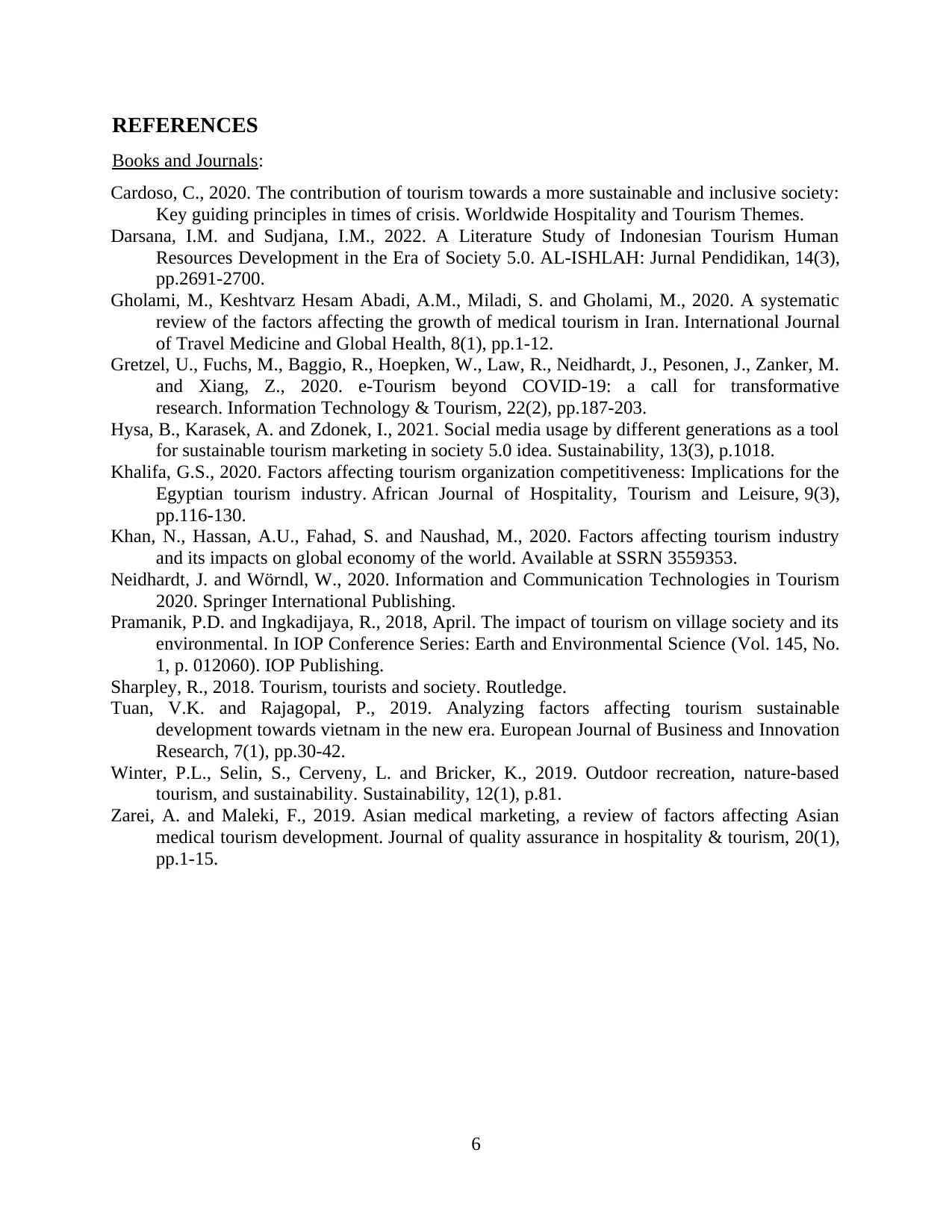
REFERENCES
Books and Journals:
Cardoso, C., 2020. The contribution of tourism towards a more sustainable and inclusive society:
Key guiding principles in times of crisis. Worldwide Hospitality and Tourism Themes.
Darsana, I.M. and Sudjana, I.M., 2022. A Literature Study of Indonesian Tourism Human
Resources Development in the Era of Society 5.0. AL-ISHLAH: Jurnal Pendidikan, 14(3),
pp.2691-2700.
Gholami, M., Keshtvarz Hesam Abadi, A.M., Miladi, S. and Gholami, M., 2020. A systematic
review of the factors affecting the growth of medical tourism in Iran. International Journal
of Travel Medicine and Global Health, 8(1), pp.1-12.
Gretzel, U., Fuchs, M., Baggio, R., Hoepken, W., Law, R., Neidhardt, J., Pesonen, J., Zanker, M.
and Xiang, Z., 2020. e-Tourism beyond COVID-19: a call for transformative
research. Information Technology & Tourism, 22(2), pp.187-203.
Hysa, B., Karasek, A. and Zdonek, I., 2021. Social media usage by different generations as a tool
for sustainable tourism marketing in society 5.0 idea. Sustainability, 13(3), p.1018.
Khalifa, G.S., 2020. Factors affecting tourism organization competitiveness: Implications for the
Egyptian tourism industry. African Journal of Hospitality, Tourism and Leisure, 9(3),
pp.116-130.
Khan, N., Hassan, A.U., Fahad, S. and Naushad, M., 2020. Factors affecting tourism industry
and its impacts on global economy of the world. Available at SSRN 3559353.
Neidhardt, J. and Wörndl, W., 2020. Information and Communication Technologies in Tourism
2020. Springer International Publishing.
Pramanik, P.D. and Ingkadijaya, R., 2018, April. The impact of tourism on village society and its
environmental. In IOP Conference Series: Earth and Environmental Science (Vol. 145, No.
1, p. 012060). IOP Publishing.
Sharpley, R., 2018. Tourism, tourists and society. Routledge.
Tuan, V.K. and Rajagopal, P., 2019. Analyzing factors affecting tourism sustainable
development towards vietnam in the new era. European Journal of Business and Innovation
Research, 7(1), pp.30-42.
Winter, P.L., Selin, S., Cerveny, L. and Bricker, K., 2019. Outdoor recreation, nature-based
tourism, and sustainability. Sustainability, 12(1), p.81.
Zarei, A. and Maleki, F., 2019. Asian medical marketing, a review of factors affecting Asian
medical tourism development. Journal of quality assurance in hospitality & tourism, 20(1),
pp.1-15.
6
Books and Journals:
Cardoso, C., 2020. The contribution of tourism towards a more sustainable and inclusive society:
Key guiding principles in times of crisis. Worldwide Hospitality and Tourism Themes.
Darsana, I.M. and Sudjana, I.M., 2022. A Literature Study of Indonesian Tourism Human
Resources Development in the Era of Society 5.0. AL-ISHLAH: Jurnal Pendidikan, 14(3),
pp.2691-2700.
Gholami, M., Keshtvarz Hesam Abadi, A.M., Miladi, S. and Gholami, M., 2020. A systematic
review of the factors affecting the growth of medical tourism in Iran. International Journal
of Travel Medicine and Global Health, 8(1), pp.1-12.
Gretzel, U., Fuchs, M., Baggio, R., Hoepken, W., Law, R., Neidhardt, J., Pesonen, J., Zanker, M.
and Xiang, Z., 2020. e-Tourism beyond COVID-19: a call for transformative
research. Information Technology & Tourism, 22(2), pp.187-203.
Hysa, B., Karasek, A. and Zdonek, I., 2021. Social media usage by different generations as a tool
for sustainable tourism marketing in society 5.0 idea. Sustainability, 13(3), p.1018.
Khalifa, G.S., 2020. Factors affecting tourism organization competitiveness: Implications for the
Egyptian tourism industry. African Journal of Hospitality, Tourism and Leisure, 9(3),
pp.116-130.
Khan, N., Hassan, A.U., Fahad, S. and Naushad, M., 2020. Factors affecting tourism industry
and its impacts on global economy of the world. Available at SSRN 3559353.
Neidhardt, J. and Wörndl, W., 2020. Information and Communication Technologies in Tourism
2020. Springer International Publishing.
Pramanik, P.D. and Ingkadijaya, R., 2018, April. The impact of tourism on village society and its
environmental. In IOP Conference Series: Earth and Environmental Science (Vol. 145, No.
1, p. 012060). IOP Publishing.
Sharpley, R., 2018. Tourism, tourists and society. Routledge.
Tuan, V.K. and Rajagopal, P., 2019. Analyzing factors affecting tourism sustainable
development towards vietnam in the new era. European Journal of Business and Innovation
Research, 7(1), pp.30-42.
Winter, P.L., Selin, S., Cerveny, L. and Bricker, K., 2019. Outdoor recreation, nature-based
tourism, and sustainability. Sustainability, 12(1), p.81.
Zarei, A. and Maleki, F., 2019. Asian medical marketing, a review of factors affecting Asian
medical tourism development. Journal of quality assurance in hospitality & tourism, 20(1),
pp.1-15.
6
1 out of 8
Related Documents
Your All-in-One AI-Powered Toolkit for Academic Success.
+13062052269
info@desklib.com
Available 24*7 on WhatsApp / Email
![[object Object]](/_next/static/media/star-bottom.7253800d.svg)
Unlock your academic potential
Copyright © 2020–2025 A2Z Services. All Rights Reserved. Developed and managed by ZUCOL.



